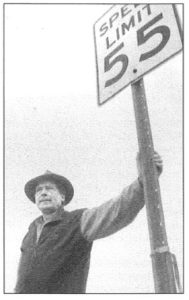Did you know that not all speeding violations will go on your driving record, even if you’re convicted? It’s true, thanks to the man shown above, Chuck Dimler. Mr. Dimler was a farmer-turned-legislator who seems to have had strong feelings about traffic laws (or may just a heavy foot?).
In 1986 he sponsored a bill that now bares his name and changed the way that traffic violation records are maintained. Under the Dimler Amendment, certain violations do not go on a person’s driving record. However, it applies only to very specific circumstances.
Under the statute, a violation will not be recorded if it occurred in a 55 mile per hour zone, and the violation was for a speed of 10 miles per hour or less over the speed limit. Therefore, in a 55 mile per hour zone, a conviction for speeding at 65 miles per hour or less will not appear on the driver’s record. A conviction for 66 or more will still be recorded, however.
Similarly, a violation will not be recorded if it occurred in a 60 mile per hour zone, if the violation was for a speed of 5 miles per hour or less over the speed limit. Thus, in a 60 mile per hour zone, a conviction for speeding at 65 miles per hour or less will not appear on the driver’s record. A conviction for 66 or more would not be affected by the Dimler amendment and would appear on the driver’s record.
Note that the law only applies to violations occurring in a 55 or 60 mile per hour zone. Any violation in any other zone will go on a person’s record. One other important exception applies as well – this does not apply to anyone with a commercial driver’s license, even if they’re not operating a commercial motor vehicle at the time of the offense. If you have a CDL, a conviction will go on your record for any speed in any zone in any vehicle.
Common Types Of Misdemeanor Charges And How A Lawyer Can Help
When we face misdemeanor charges, the situation may not seem as severe as a felony case, but it’s still serious. Misdemeanors can carry penalties that affect our freedom, finances, and future. From fines and probation to potential jail time, the consequences of a misdemeanor conviction can be life-altering. That’s why it’s so important to understand the most common types of misdemeanor charges and how our Minneapolis, MN misdemeanor lawyer can help us navigate the legal process and protect our rights.
What Are Misdemeanors?
Misdemeanors are criminal offenses that are generally considered less severe than felonies. However, they still come with significant penalties, including:
-
Jail time (usually up to one year)
-
Fines (ranging from a few hundred to several thousand dollars)
-
Probation
-
Community service
-
A permanent criminal record
Although misdemeanors are categorized as “less serious” crimes, a conviction can impact our employment, housing, and reputation. Let’s explore some of the most common misdemeanor charges and how an experienced lawyer can help us defend against them.
1. DUI Or DWI (Driving Under The Influence)
At Archambault Criminal Defense, we can confirm that one of the most common misdemeanors is driving under the influence of alcohol or drugs. A DUI or DWI conviction can result in:
-
License suspension
-
Heavy fines
-
Mandatory alcohol education programs
-
Jail time
A misdemeanor lawyer can examine whether the traffic stop was legal, challenge breathalyzer results, and negotiate for reduced penalties or alternative sentencing programs.
2. Theft And Shoplifting
If we’re accused of stealing property valued below a certain threshold, it’s usually charged as a misdemeanor. Penalties can include:
-
Fines and restitution
-
Community service
-
Jail time
A lawyer can argue for reduced charges, present evidence of mistaken identity, or work toward a diversion program to keep the conviction off our record.
3. Assault And Battery
Misdemeanor assault charges often stem from minor physical altercations that do not result in severe injuries. Possible penalties include:
-
Jail time
-
Probation
-
Anger management classes
An experienced lawyer can investigate whether we acted in self-defense or if the alleged victim exaggerated the situation, helping us avoid the harshest penalties.
4. Drug Possession
Possessing small amounts of illegal substances is typically a misdemeanor. Depending on the substance and local laws, penalties may include:
-
Fines
-
Drug counseling programs
-
Jail time
Our lawyer can challenge the legality of a search, argue for substance abuse treatment programs, or negotiate for case dismissal through pre-trial diversion.
How Can A Misdemeanor Lawyer Help Us?
When we’re facing misdemeanor charges, having a skilled lawyer on our side makes a significant difference. Here’s how they can help:
-
Protect Our Rights – Ensure law enforcement followed proper procedures during the arrest and investigation.
-
Build a Defense – Gather evidence, interview witnesses, and identify legal defenses.
-
Negotiate Plea Bargains – Work with prosecutors to reduce charges, minimize penalties, or secure alternative sentencing.
-
Avoid a Criminal Record – Pursue expungement or record sealing if available under the law.
Misdemeanor charges should never be taken lightly. Even a “minor” conviction can have long-term effects on our lives. By working with our Minneapolis misdemeanor lawyer, we can protect our rights, build a strong defense, and work toward the best possible outcome. If we find ourselves facing misdemeanor charges, seeking legal help immediately is the best step we can take to safeguard our future.


